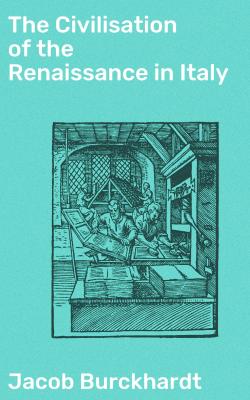Скачать книгу
Poetical parodies
158
Theory of wit
159
Railing and reviling
161
Adrian VI. as scapegoat
162
Pietro Aretino
164
PART III. THE REVIVAL OF ANTIQUITY.
CHAPTER I. INTRODUCTORY REMARKS.
Widened application of the word ‘Renaissance’
171
Antiquity in the Middle Ages
172
Latin poetry of the twelfth century in Italy
173
The spirit of the fourteenth century
175
CHAPTER II. ROME, THE CITY OF RUINS.
Dante, Petrarch, Uberti
177
Rome at the time of Poggio
179
Nicholas V., and Pius II. as an antiquarian
180
Antiquity outside Rome
181
Affiliation of families and cities on Rome
182
The Roman corpse
183
Excavations and architectural plans
184
Rome under Leo X.
184
Sentimental effect of ruins
185
CHAPTER III. THE OLD AUTHORS.
Their diffusion in the fourteenth century
187
Discoveries in the fifteenth century
188
The libraries
189
Copyists and ‘Scrittori’
192
Printing
194
Greek scholarship
195
Oriental scholarship
197
Pico’s view of antiquity
202
CHAPTER IV. HUMANISM IN THE FOURTEENTH CENTURY.
Its inevitable victory
203
Dante, Petrarch, and Boccaccio
205
Coronation of the poets
207
CHAPTER V. THE UNIVERSITIES AND SCHOOLS.
Position of the Humanists at the Universities
211
Latin schools
213
Freer education: Vittorino da Feltre
213
Guarino of Verona
215
The education of princes
216
CHAPTER VI. THE FURTHERERS OF HUMANISM.
Florentine citizens: Niccoli and Manetti
217
The earlier Medici
220
Humanism at the Courts
222
The Popes from Nicholas V. onwards
223
Alfonso of Naples
225
Frederick of Urbino
227
The Houses of Sforza and Este
227
Sigismodo Malatesta
228
CHAPTER VII. THE REPRODUCTION OF ANTIQUITY. LATIN CORRESPONDENCE AND ORATIONS.
The Papal Chancery
230
Letter-writing
232
The orators
233
Political, diplomatic, and funeral orations
236
Academic and military speeches
237
Latin sermons
238
Form and matter of the speeches
239
Скачать книгу
















